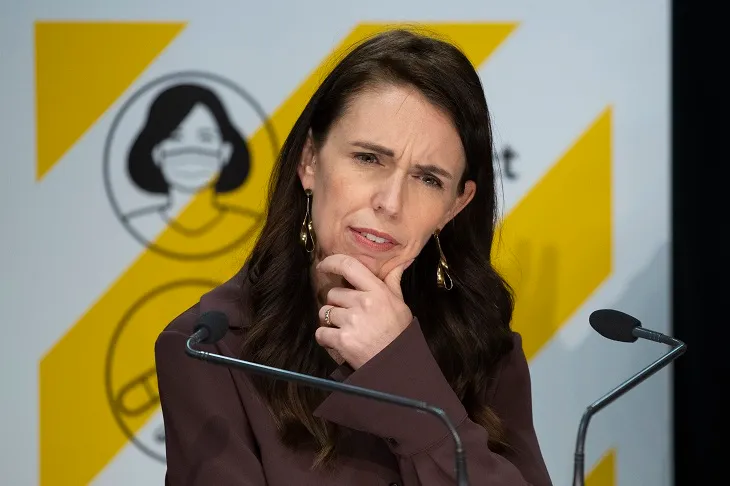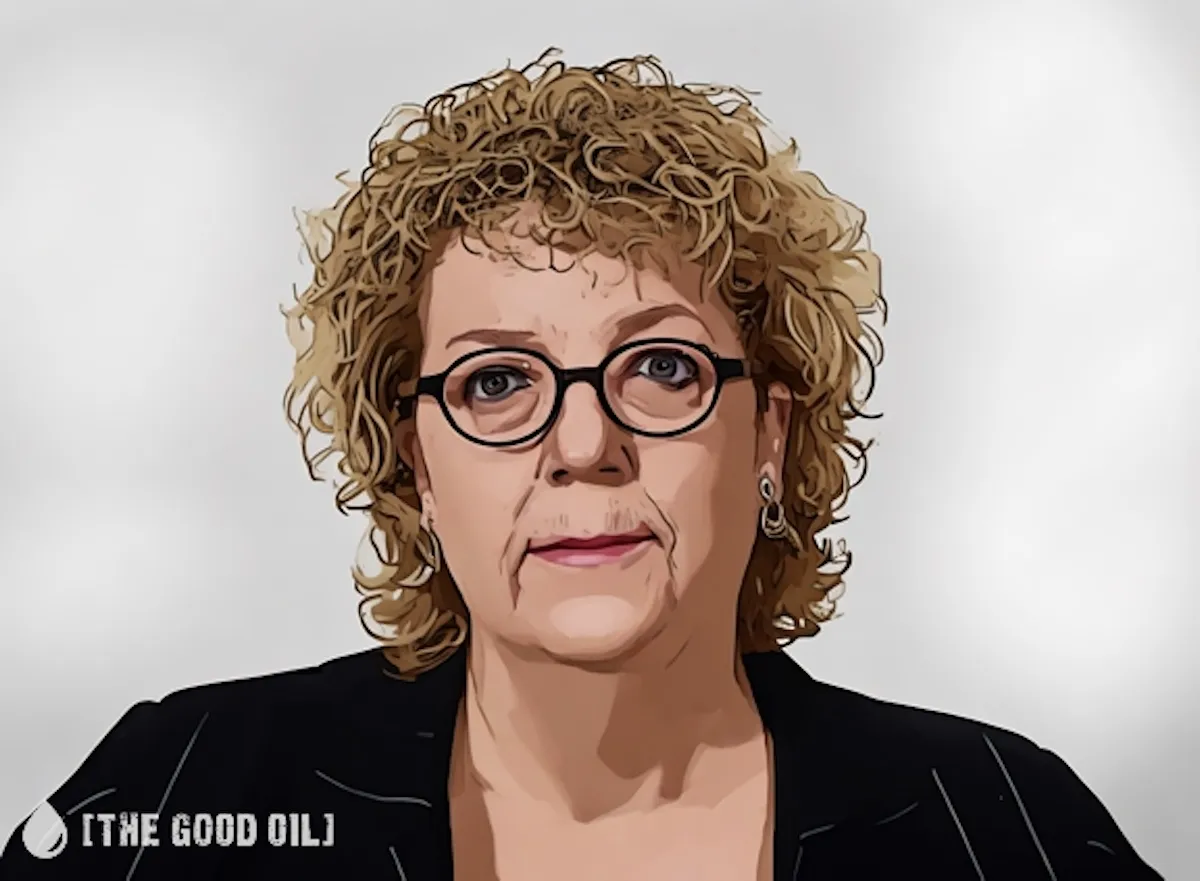Martin Hanson
On February 8, a convoy of protesters began to set up camp in Parliament’s grounds. The camp grew into a mini-village, with portaloos and child care with on-the-hoof schooling.
The protesters demanded that Prime Minister Ardern meet them to discuss concerns, but were met by blanket refusal, though she could not have been ignorant of the validity of their case.
Malfeasance
Myocarditis is a normally rare condition in which the heart muscle (myocardium) becomes inflamed, which in severe cases can result in cardiac arrest and death. In 2021, soon after the worldwide programme of Covid-19 mass injections was initiated, reports of deaths from myocarditis began to surface. Such reports became so numerous that they became difficult for medical authorities to ignore.
Yet at a press conference on 19 August 2021, Prime Minister Ardern said (at 22:15):
As you know, it’s imperative that we get as many people as possible vaccinated. When we make a decision on who is eligible, though, our No 1 priority is the medical advice of our experts. You will remember that in June, our regulator, Medsafe, granted provisional approval for the Pfizer vaccine to be given to 12- to 15-year-olds in New Zealand. Similar decisions have been made by other regulators in Europe, the US, Canada and Japan. The advice was then considered by an additional group of experts, who also supported an extension of eligibility to young people. On that basis, cabinet has agreed to make the Pfizer vaccine available for 12- to 15-year-olds. This is not a decision we have taken lightly.
Many of us are parents ourselves and take this duty of making decisions about other people’s children extremely seriously, but it is safe, and it’s the right thing to do. So 12- to 15-year-olds can become eligible and book, along with everyone else that we are opening up to from the 1st of September (emphasis added).
This was the take-home message for the assembled journalists: based on expert advice: The vaccine was “safe, and the right thing to do”.
Except that it wasn’t safe, according to their own expert medical advisers. Advice that the Labour Government had knowingly and deliberately ignored, following a report by the CV TAG (COVID-19 Vaccine Technical Advisory Group), chaired by the chief science advisor, Dr Ian Town.
Had it not been for a certain investigative blogger working under the name ‘Thomas Cranmer’, it’s likely that the public would have continued to be deceived.
On June 24 CV TAG issued a memo headed “Decision to use the Pfizer mRNA Covid-19 vaccine for children aged 12-15 years”. Among the group’s recommendations were the following:
- there is a potential safety signal for myocarditis in people under 30 years who receive mRNA vaccines (e.g. Pfizer/BioNTech and Moderna), which requires ongoing consideration
- overall, there is not an urgent need to progress with vaccination of this group, but consideration should be given to equity and whanau-based approaches and ensuring that other childhood immunisation programmes are not compromised, eg measles and HPV vaccination
What happened to the “safety signal for myocarditis”? The Government knew about it, yet ignored the advice from their experts.
And there’s more. The cabinet paper dated September 27, 2021, prepared by Chris Hipkins, the Covid minister, stated in point 17 of the executive summary that:
subsequent advice from CV TAG in August, supported the inclusion of all children aged 12- to 15-years in the Immunisation Programme
The paper continued:
based on the advice received from the Director-General of Health, I recommend that cabinet agree to proceed with using the Pfizer vaccine for children aged 12- to 15-years (emphasis added).
And what about the advice from CV TAG in August? A memo from CG TAG to Joanne Gibbs, director of national operations Covid Vaccination Immunisation Programme, and Dr Ashley Bloomfield, dated August 4: Among its 13 recommendations, 12d was as follows:
- The COVID-19 vaccine should not be routinely administered to children and young people aged 12 to 15 years of age, at this time. Children and young people have a low risk of severe disease or death due to Covid-19 compared to adults, and, given the low prevalence of SARS-CoV-2 infection in Aotearoa New Zealand, there is currently a low risk of exposure (emphasis added).
This, and much more on Cranmer at:
https://cranmer.substack.com/p/covid-and-our-kiwi-kids-part-1
and
https://cranmer.substack.com/p/covid-and-our-kiwi-kids-part-2
Divisiveness
Following her landslide victory in the general election in October 2020, Jacinda Ardern told her adoring crowd in the Auckland Town Hall that Labour will be “a party for all New Zealanders”. She received a standing ovation.
Fast forward to 23 November 2021, when she announced a ‘traffic light’ system, or “Covid-19 protection system”. She said:
“For the most part, if you’re vaccinated, you can go about doing all the kinds of things you’d usually expect … what varies is just how large those gatherings are at different levels”.
Each area would be designated one of three settings – green, orange or red. A key factor determining each region’s ‘colour’ on 3 December would be its level of vaccination, Ardern said.
“If you want to be guaranteed that no matter the setting that we are in, that you can go to bars, restaurants and close-proximity businesses like a hairdresser, then you will need to be vaccinated,” Ardern told a press conference on 22 October.
Under the ‘traffic light’ policy, in ‘red’ zones, people who are jabbed will be able to move around and use services relatively freely, while those who are unjabbed will not. In an interview with the New Zealand Herald on 24 October, the reporter asked Ardern if her policies were intended to create a two-tier society in New Zealand where unvaccinated citizens did not enjoy the same rights as those vaccinated against Covid-19.
“Yip Yip. That is what it is,” Ardern responded as she smiled. She added that it’s about giving “confidence” to those vaccinated.
Ardern’s restrictions on liberties generated headlines overseas:
UK’s Independent: “Jacinda Ardern admits New Zealand will become a two-tier society between vaccinated and unvaccinated”
And the Daily Telegraph (25 Oct): “New Zealand is moving to a two-tier society, but the unvaccinated are already a global underclass”
Cruelty
Following her resignation, Jacinda Ardern was asked how she would like New Zealanders to remember her leadership, she said, “As someone who always tried to be kind”.
It’s doubtful if many of the 50,000 New Zealanders who were locked out of their own country would agree. Cameron Carpenter, writing for the Daily Mail Australia, tells how he was prevented from returning from Sydney to visit his seriously concussed mother, a mental health nurse, in Wellington. Like the great majority of ex-pats, he was prevented from returning home for two years. As Carpenter put it:
“In a staggering human rights violation, New Zealand citizens overseas had to apply to enter their own country, with a small number of places only available via an online lottery system.”
Even worse was the predicament of pregnant New Zealand women who were stranded overseas during lockdowns. Although people with medical conditions overseas were able to return to New Zealand, pregnancy and childbirth were excluded. This was brought into sharp focus by the case of Charlotte Bellis, an Al Jazeera journalist in Afghanistan, who was prevented from returning to New Zealand where her baby could be born safely. But after submitting 59 documents in attempting to return to New Zealand, her application was rejected. In a speech attacking the Government’s Covid-19 response, ACT leader David Seymour said:
“… that great feminist organisation the Taliban has now been given the outsourcing of New Zealand’s maternity care”.
In response to the international publicity, the Government finally caved in and allowed her back in her home country.
But for pregnant ex-pat Kiwis forced to give birth overseas, there was another problem – citizenship for the child. Under New Zealand law, babies that are born overseas can’t automatically pass on New Zealand citizenship to their own children.
Unconscionable
Sophia Malthus is a 25-year-old woman who became tetraplegic after a riding accident. Her full-time carer is her mother, who is unvaccinated for medical reasons. Despite her GP’s letter explaining her situation, the Ministry of Health (MOH) is yet to give her an exemption from the mandate.
For people with spinal cord injuries, respiratory infections can be particularly serious, as they may have additional breathing difficulties. Accordingly, Malthus has been particularly careful to minimise her risk by keeping her social contacts during lockdown to the absolute minimum.
But now the MOH has ruled that since her mother is unvaccinated, she cannot be allowed to care for her and the healthcare agency will have to replace her mother with vaccinated carers, even though she will continue to live with her daughter. And with her mother doing 60-hour weeks, she would have to be replaced by more than one carer.
“This mandate that’s intended to protect me, pretty much doubles my exposure to Covid,” she said. “I’ll have two or three new carers coming into the house and they all have their own families that they live with, and everybody wants to go back to work – so my bubble would be bigger than everybody else’s bubble.”
As a result of the mandate she cannot get ACC funding for her mother to act as her carer because of the alleged risk she poses by being near her daughter, with whom she lives anyway, whether or not she is acting as carer. Sophia’s risk of infection has thus been actually increased by the mandate.
That was in November 2021. One would have thought that the authorities might have learned something from the debacle, but it seems not.
A not altogether different case was detailed by RNZ on 19 September 2022. A group who care for family members with whom they are living is seeking a judicial review of the health workers’ mandate, having lost thousands of dollars in funding. Despite the fact that the workers care for family members with whom they are living, their payments have been cut because they are not Covid-vaccinated. And although the mandates were due to be removed, they believe that the loss of payments was unlawful.
One member of the group cares for her brain-injured son, but is unvaccinated for personal reasons. Jennie had been receiving over $1000 a week as an in-home carer, but when she became included in the health workers’ vaccine mandate, funding was cut.
“It was a huge financial stress, and we’ve had to carry out the care regardless of whether we’re paid to do it or not, so it did seem a little bit silly that we are living in the same house, carrying out the care anyway, but we are having the funding cut,” Jennie said.
After initially leaving family carers out of the mandate, MOH officials then ruled that in-home carers should be treated the same as other workers.
“To me that seems completely ridiculous because we’re not the same as the other employees in the sector,” Jennie said.
“It’s not a public health approach, which is what the vaccine order is meant to be all about.”
Wellington lawyer Matthew Hague has been acting for the group of home-based care workers. Via the High Court, he argued that their inclusion lacked reason, given they mostly lived with the person they cared for.
Despite requests, the group had not been given any health reason for the mandate applying to them.
“We asked the Government exactly that. We said, first of all, ‘Can you please review this? There’s some concerning parts about it. Secondly, if there is a reason can you let us know so we can tell the people it affects.’
“There was zero response to that.”
Hague said one of the people involved in the court action had received an Official Information Act reply from the Covid-19 response minister that spelled out officials’ position.
“She says, and this is from Ayesha Verrall, ‘The distinction between family and non-family carers was not considered to be relevant to public health and so was removed to ensure that all vulnerable people received the same protection, whether cared for by a family carer or not.’
“It’s very clear from that that the purpose of the change is to protect the people being cared for, but it doesn’t because they’re already living with them.”
I used the heading ‘unconscionable’ to describe the MOH’s treatment of full-time family carers, because I could not find words that were adequate. Malice, spite, vindictiveness come to mind. I suppose it’s just conceivable that it’s bureaucratic blockheadedness, but to me, there has to be an element of motive. Callous might come nearer, but you’ll have to judge for yourselves.
So, how does all this stack up with Ardern’s trademark of ‘kindness’? The first thing to strike one is that genuinely kind people don’t feel the need to advertise or promote their kindness – they just get on with being kind, because that’s the sort of people they are. I think I’ve gathered more than enough evidence to suggest that rather than being the “queen of empathy”, Ms Ardern is a psychopath.
In the public mind the psychopath is a violent, often sadistic, murderer like Hannibal Lecter. But most psychopaths are not criminal or violent; though there is a higher proportion in prisons, the vast majority blend in with the rest of society and are often highly successful professionally.
Moreover, they are surprisingly common. In all societies studied they constitute between one and two per cent of adult males (most are males), so most of us will have known at least one. A key characteristic is a complete incapacity for empathy – the ability to identify with the suffering of others. The psychopaths also tend to be egocentric, deceitful, glib, shallow and prone to risk-taking.
For normal people there is an unspoken understanding that to receive, one must be prepared to give. This ‘golden rule’ is learned in childhood, but psychopaths have no capacity for such learning. There is no reciprocity: it’s all take. Psychopaths are like predators, and we are their prey.
Psychopathy is not a mental illness but a personality disorder. Whilst psychopaths cognitively distinguish between right and wrong, they don’t feel the difference emotionally. What makes them so dangerous is that they are often skilled at acting as if they feel the difference, which is why they are so adept at deception – witness the ‘Jacindamania’, stoked by the servile and fawning media. This enables them to take decisions without the need to take into account complicating moral considerations of conscience that put such inconvenient constraints on the rest of us.
Unsurprisingly, psychopaths are over-represented in some occupations, particularly politics, business and finance, in which power plays a dominant role. The proportion of psychopaths among corporate bosses is significantly higher than in the general population, according to research by forensic psychologist Nathan Brooks of Bond University.
Why is this? Do psychopaths tend to prefer certain occupations, or do these occupations preferentially recruit and promote such people? The journalist and entrepreneur Brian Basham, writing in the Independent, recalls a senior UK investment banker saying: “At one major investment bank for which I worked, we used psychometric testing to recruit social psychopaths because their characteristics exactly suited them to senior corporate finance roles.”
So perhaps we should not be surprised that Jacinda Ardern has managed to deceive so many. It’s interesting that she spent two-and-a-half years working in the cabinet office of UK Prime Minister Tony Blair. Many who have read Geoffrey Wheatcroft’s Yo, Blair!, a blowtorch biography of the politician, will see parallels between Ardern and Blair. Indeed, in his review in the UK Sunday Telegraph, Anthony Howard describes the book as:
“The best account I’ve seen of what can happen when a political leader chooses to clothe himself simply in the armour of self-righteousness.”










